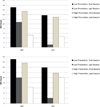Motivational deficits differentially predict improvement in a randomized trial of self-system therapy for depression
- PMID: 25867448
- PMCID: PMC4446180
- DOI: 10.1037/a0039058
Motivational deficits differentially predict improvement in a randomized trial of self-system therapy for depression
Abstract
Objective: A randomized trial compared the time course and differential predictors of symptom improvement in 2 treatments for depression.
Method: Forty-nine adults (84% female) who were not taking antidepressant medications and met diagnostic criteria for major depressive disorder or dysthymia were randomly assigned either to cognitive-behavioral therapy (CBT) or self-system therapy (SST), a treatment that targets problems in self-regulation, the ongoing process of evaluating progress toward personal goals. Self-regulatory variables (promotion and prevention focus and goal disengagement and reengagement) were assessed as potential moderators of efficacy. At intake, most participants reported depression in the moderate to severe range and had histories of recurrent episodes and previous treatment attempts. Self-reported symptoms of depression and anxiety were assessed at each therapy session. Multilevel modeling was used to examine (a) differences in change associated with the treatment conditions and (b) moderation of treatment efficacy by pretreatment measures of self-regulatory deficits.
Results: Both treatments were effective and did not show differences in the magnitude or rate of symptom change or in dropout rates, suggesting that CBT and SST were equally effective in improving depression and anxiety. Patients with self-regulatory deficits, however, showed greater improvement in depressive symptoms with SST. Specifically, patients with low promotion focus and low goal reengagement responded better to SST, whereas patients with high prevention focus responded better to CBT.
Conclusions: Overall, the results corroborate previous research suggesting that SST is a viable short-term treatment for depression that is particularly effective in helping patients compensate for self-regulatory deficits.
Trial registration: ClinicalTrials.gov NCT02134678.
(c) 2015 APA, all rights reserved).
Figures







References
-
- American Psychiatric Association. Diagnostic and statistical manual of mental disorders. 4th ed. Washington, DC: American Psychiatric Publishing, Inc; 2000. - text revision.
-
- Barlow DH, Allen LB, Choate ML. Toward a unified treatment for emotional disorders. Behavior Therapy. 2004;35(2):205–230. - PubMed
-
- Beck AT, Epstein N, Brown G, Steer RA. An inventory for measuring clinical anxiety: Psychometric properties. Journal of Consulting and Clinical Psychology. 1988;56(6):893–897. - PubMed
-
- Beck AT, Steer RA, Brown GK. Manual for the Beck Depression Inventory-II. San Antonio, TX: Psychological Corporation; 1996.
-
- Beck JS. Cognitive Behavior Therapy: Basics and Beyond. Second Edition. New York: Guilford Press; 2011.
Publication types
MeSH terms
Associated data
Grants and funding
LinkOut - more resources
Full Text Sources
Other Literature Sources
Medical
Miscellaneous

